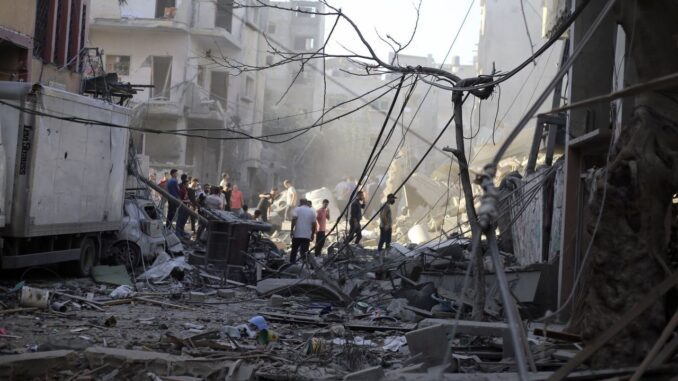
US officials, both current and former, say the Biden administration’s shift reflects Arab allies’ complaints and frustration with Israel’s deadly strikes, reported MEE.
A growing split is emerging between the US and Israel over the war in Gaza as civilian casualties mount, and the Biden administration faces calls from friends at home and abroad to rein in its ally, according to MEE.
President Joe Biden aired his clearest public frustration with Israel on Thursday saying it was “taking a little longer” than he had hoped to achieve “humanitarian pauses” as residents in northern Gaza continue to be displaced to the southern portion of the strip.
The four-hour daily pauses that the White House said Israel agreed to implement on Thursday fell far short of the three-day durations that Biden said he lobbied Israeli Prime Minister Benjamin Netanyahu for.
“Right now, you can draw a direct connection between what the White House has said it wants on certain cases and what Netanyahu has done in defiance,” a US official familiar with the administration’s thinking told MEE, on condition of anonymity.
The Israelis have also downplayed the White House’s characterisation of the pauses, saying they were “tactical” in nature and already in place.
The Biden administration, however, continues to back Israel in the war. It has ruled out calling for a ceasefire, saying it would allow Hamas to regroup, and says it is not imposing red lines on any Israeli military action.
But in the last three days, there has been a marked shift in its rhetoric on civilian casualties.
The State Department’s top Middle East official said on Wednesday that deaths in the Gaza Strip were “likely higher” than are being cited, contrasting sharply with Biden’s suggestion last month that the death toll reported by Palestinian health officials in Gaza was not reliable.
US Secretary of State Antony Blinken said on Friday that “far too many” Palestinians have “died and suffered” as Israel wages war in the Gaza Strip and that “much more needs to be done in terms of protecting civilians”.
A former senior US official familiar with the administration’s thinking said that the tone from American officials reflected a general unease with the rising death toll, which topped 11,000 Palestinians this week, including more than 4,500 children, as well as increasing pressure from Arab allies.
Last week, in one of the war’s deadliest strikes, Israeli warplanes bombed the densely populated Jabalia refugee camp, killing hundreds of people, according to Palestinian health officials. This week, multiple hospitals have been hit, and on Friday, Israeli snipers opened fire on al-Quds Hospital, killing one and wounding 20.
“The level of collateral damage the [Israeli army] has been willing to inflict is completely different from US military criteria,” the former official said. “It’s utterly unacceptable for the US military.”
The high civilian death toll has primarily been a focus of the progressive left in Biden’s party, but as the numbers rise, there are signs that pushback is growing among centrists.
On Wednesday, 24 democrats and two independents who caucus with them wrote a letter asking the administration to explain how it would seek to mitigate civilian casualties and ensure that the $14bn of additional military aid to Israel was used in keeping with international law.
Meanwhile, this week, General Charles Q Brown, chairman of the US Joint Chiefs of Staff, provided some of the most senior-level insights into the Biden administration’s concerns about the war.
Brown said Israel’s stated goal to eliminate Hamas was “a pretty large order” and that “the longer this goes, the harder it can become” as a mounting civilian death toll risks new Hamas recruits.
Brown hinted publicly at what US allies in the region have been telling their American counterparts in private.
According to a previous report by MEE, Egypt has been warning US officials that it’s unrealistic to eliminate Hamas.
During a visit to the region this week, Blinken stood by while his Turkish, Egyptian, and Jordanian counterparts demanded a ceasefire to the war, underscoring the gap between Washington and its regional partners.
“The pressure from key Arab and regional partners for the US to take a different approach to the war is becoming tremendous,” Josh Paul, a former State Department official who resigned in protest over US arms transfers to Israel last month, said.
“If we do see the Biden administration begin to pressure Israel more, it might be because of that, more than any domestic political backlash within the Democratic Party,” he said.
But Brian Katulis, vice president of policy at the Middle East Institute, said it was uncertain whether Israel would respond to US appeals.
“Israel has shown its willing to go-it alone,” Katulis said. “The Israelis are responding to what they perceive as their threat environment.”
The US provides Israel with $3.8bn in military aid per year, but Katulis said the administration would be unlikely to restrict arms transfers.
The challenges of addressing the concerns of Arab partners, containing the conflict in Gaza and managing ties with Israel came to the fore this week after Netanyahu claimed that Israel would maintain an “indefinite security presence” in the Gaza Strip.
The Biden administration was forced into overdrive, reiterating its opposition to an Israeli occupation of the enclave.
Daniel Byman, a senior fellow and expert in counterterrorism with the Center for Strategic and International Studies think tank, told MEE that Netanyahu’s statement was “ambiguous”, but that the US had no interest in seeing its top Middle East ally enmeshed in Gaza long-term.
“Israel would face constant criticism, there will be higher civilian deaths, and Hamas would continue to drag out the fight as insurgents do,” Byman said.
“The US wants any Israeli security presence to be indirect and low profile.”
On Friday, Netanyahu said Israel does not intend to occupy or govern Gaza after the end of the war, but the besieged enclave had to be “demilitarised, deradicalised and rebuilt”.
US officials say they want a revived Palestinian Authority to govern the Gaza Strip along with the occupied West Bank, but the White House is open to “some transition period”, indicating they may tolerate some kind of Israeli presence within the Gaza Strip.
The US has been lobbying its Arab partners to help manage a post-conflict Gaza, but those appeals have been rebuffed, former and current Arab officials said.
“Israel and the US need to find Arab partners,” Byman said. “But they don’t want to be a front-facing part of this.”



